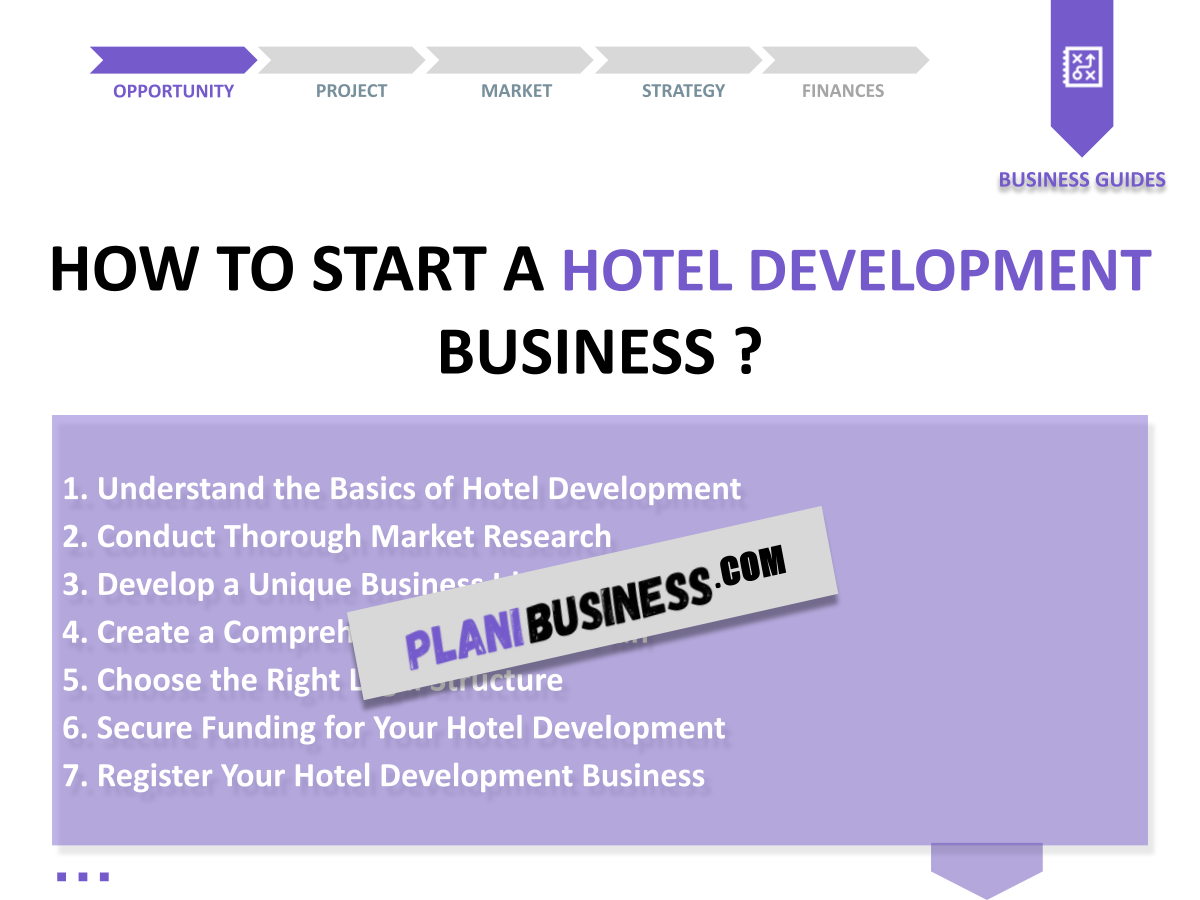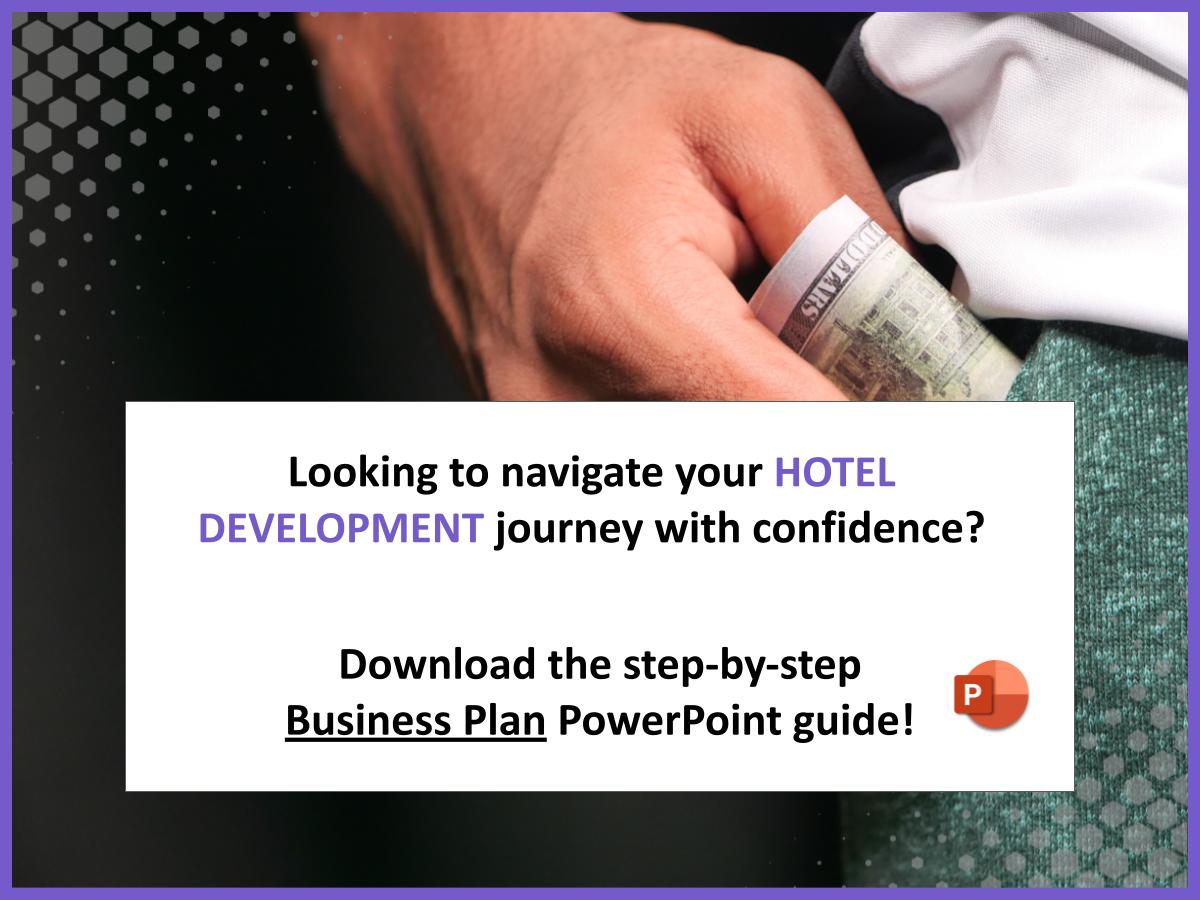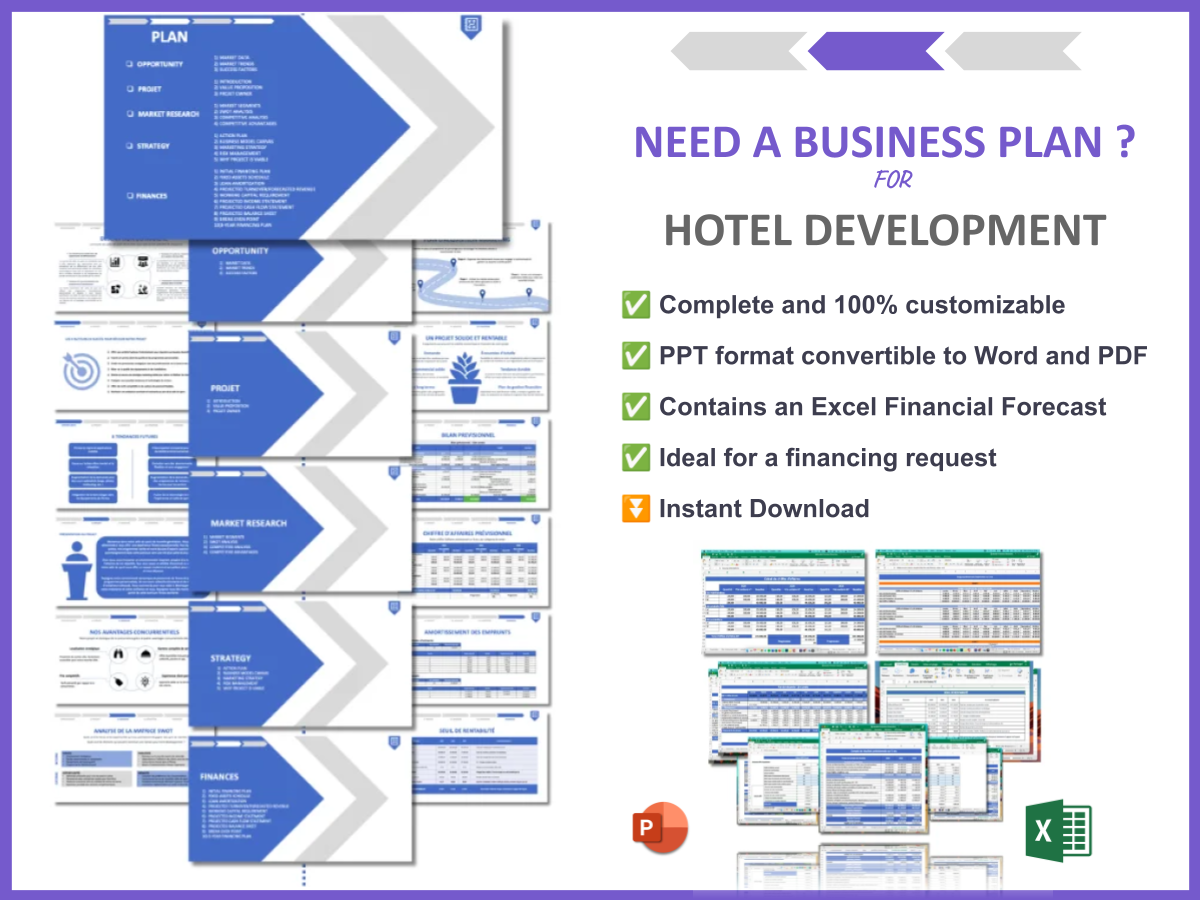Are you considering embarking on the journey of starting your own hotel development? You’re not alone! The hotel industry is booming, with an expected growth rate of over 5% annually, presenting countless opportunities for aspiring entrepreneurs. In this article, we’ll explore the essential steps and strategies on how to start a hotel development business, ensuring you have the knowledge and resources needed to succeed.
To put it simply, hotel development involves the planning, financing, and construction of a property designed to accommodate guests. This process requires a keen understanding of market demands and a commitment to excellence.
- Understand the fundamentals of hotel development
- Conduct comprehensive market research
- Develop a unique business idea
- Create a detailed business plan
- Choose the right legal structure
- Secure necessary funding
1. Understand the Basics of Hotel Development
To successfully start a hotel development, it’s essential to understand the foundational elements that comprise the industry. This means familiarizing yourself with the various types of hotels, the hospitality market, and what guests expect from their stays. For instance, did you know that the hotel industry has seen a steady increase in demand due to the rise in global travel?
Essentially, hotel development involves several stages:
- Planning and conceptualizing the hotel design
- Identifying target markets and guest expectations
- Understanding the competitive landscape
By grasping these fundamentals, you will be better equipped to navigate the complexities of the industry. The following table outlines the key aspects of hotel development:
| Aspect | Importance |
|---|---|
| Market Research | Identifies demand and potential challenges |
| Location Analysis | Determines accessibility and attractiveness |
| Design Concepts | Influences guest experience and satisfaction |
2. Conduct Thorough Market Research
Before diving headfirst into your hotel development project, conducting thorough market research is crucial. This step helps you assess the feasibility of your idea by evaluating factors such as location, competition, and overall demand.
Start by analyzing the hospitality landscape in your chosen area. Ask yourself:
- What are the current trends in the hotel industry?
- Who are my main competitors, and what are their strengths and weaknesses?
- What specific needs or gaps exist in the market that my hotel can fulfill?
Utilize various data sources to gather relevant information. The following table provides insight into different research areas, key questions to consider, and potential data sources:
| Research Area | Key Questions | Data Sources |
|---|---|---|
| Location | Is it easily accessible? What attractions are nearby? | Local tourism boards, city planning departments |
| Competition | Who are my competitors? What are their strengths? | Industry reports, online reviews |
| Demand | What is the expected occupancy rate for my hotel type? | Market analysis reports, surveys |
By conducting comprehensive market research, you will not only gain valuable insights but also build a strong foundation for your hotel development project. This preparation will ultimately enhance your chances of success in this competitive industry.
3. Develop a Unique Business Idea for Your Hotel
Your concept is what will set your hotel apart from the competition. It’s essential to think creatively about the niche you want to fill in the market. Will your hotel focus on luxury, sustainability, or perhaps a unique local experience? Understanding your target audience and their preferences is key to developing a successful business idea.
Start brainstorming by considering the following:
- What type of experience do you want to offer your guests?
- How can you incorporate local culture and attractions into your hotel?
- What amenities will differentiate your hotel from others in the area?
Creating a mood board can be an effective way to visualize your ideas and refine your vision. This will not only help you clarify your concept but also assist in communicating your idea to potential investors and partners.
To further illustrate the importance of a unique concept, consider this table showcasing different hotel types and their unique selling propositions:
| Hotel Type | Unique Selling Proposition |
|---|---|
| Luxury Hotel | High-end amenities, personalized services |
| Eco-Friendly Hotel | Sustainable practices, organic food options |
| Boutique Hotel | Unique design, local art, personalized experience |
By developing a unique business idea that resonates with your target market, you will create a strong foundation for your hotel development journey. This concept will not only attract guests but also help build brand loyalty in the long run.
4. Create a Comprehensive Business Plan
Having a solid business plan is essential for any hotel development. It serves as your roadmap, outlining your vision and strategy for success. A well-crafted business plan is often required by investors and lenders, making it a critical component of your project.
Your business plan should cover various essential aspects, including:
- Executive Summary: A brief overview of your hotel concept and goals.
- Market Analysis: Insights from your research, including target demographics and competitive landscape.
- Financial Projections: Estimated costs, revenue forecasts, and funding requirements.
For a more detailed guide, I recommend checking out this business plan template for Hotel Development. It’s super detailed and can save you a ton of time!
When creating your business plan, be sure to include a clear timeline for development and milestones you hope to achieve. This will not only keep you on track but also provide potential investors with a sense of your planning and foresight.
In summary, a comprehensive business plan is not just a formality; it’s a vital tool that will guide your hotel development process and help you make informed decisions as you move forward.
5. Choose the Right Legal Structure
Deciding on the legal structure of your hotel development business is a crucial step. The structure you choose will affect your taxes, liability, and how you can raise funds. You have several options, including:
- Sole Proprietorship: Simple to set up, but you are personally liable for debts.
- Partnership: Shared responsibility and resources, but potential for conflict.
- Limited Liability Company (LLC): Protects personal assets while providing flexibility in management.
- Corporation: More complex but offers the best protection against personal liability.
It’s essential to weigh the pros and cons of each structure. Consulting with a legal expert can help you navigate this decision effectively. They can provide insights into local regulations and assist you in understanding the implications of each choice.
To help you visualize the differences, here’s a table summarizing the key features of each legal structure:
| Legal Structure | Liability Protection | Tax Implications | Complexity |
|---|---|---|---|
| Sole Proprietorship | None | Personal income tax | Low |
| Partnership | None | Personal income tax | Medium |
| LLC | Yes | Pass-through taxation | Medium |
| Corporation | Yes | Double taxation | High |
Choosing the right legal structure is not just about compliance; it also sets the foundation for your hotel development strategy. Make this decision wisely to ensure a smoother path ahead.
6. Secure Funding for Your Hotel Development
Funding is often one of the most significant hurdles when it comes to starting a hotel development. Without adequate financial resources, even the best ideas can falter. There are various options available for securing funding, and understanding these can help you make informed decisions.
Here are some common funding sources:
- Bank Loans: Traditional financing with lower interest rates, but strict eligibility requirements.
- Private Investors: Individuals or groups willing to invest in exchange for equity or a share of profits.
- Crowdfunding: Raising small amounts of money from many people, often through online platforms.
- Grants: Some government programs offer grants for hospitality projects, particularly those focused on sustainability.
When seeking funding, it’s essential to prepare a convincing pitch. Highlight your market research, business plan, and financial projections to demonstrate the viability of your hotel development project.
To give you a clearer picture, here’s a table outlining the pros and cons of each funding option:
| Funding Source | Pros | Cons |
|---|---|---|
| Bank Loans | Lower interest rates | Strict eligibility criteria |
| Private Investors | Flexible terms | Potential loss of control |
| Crowdfunding | Access to a wider audience | May require extensive marketing |
| Grants | No repayment required | Highly competitive |
Securing funding for your hotel development is not just about the money; it’s about finding the right partners and resources to bring your vision to life. By exploring multiple funding avenues, you can increase your chances of success in this competitive industry.
7. Register Your Hotel Development Business
Once you’ve completed the initial planning stages and secured funding, it’s time to make your hotel development business official. Registering your business is a crucial step that legitimizes your operations and protects your brand.
The process typically involves:
- Choosing a Business Name: Select a unique name that reflects your hotel’s concept and is not already in use.
- Filing the Necessary Paperwork: This may include registration forms with your local government or state.
- Obtaining a Business License: Depending on your location, you may need specific licenses to operate legally.
Make sure to check with your local government or business office to understand the exact requirements in your area. This can vary widely depending on where you are located.
Additionally, it’s wise to consider trademarking your business name and logo. This will protect your brand identity and prevent others from using similar names in the hospitality industry.
By taking the necessary steps to register your hotel development business, you set the stage for future growth and success, ensuring that you can operate without legal hurdles.
8. Obtain Necessary Permits and Licenses
After registering your business, obtaining the necessary permits and licenses is crucial for your hotel development. This step ensures that your operations comply with local laws and regulations.
The types of permits and licenses you may need include:
- Zoning Permits: Ensure that your chosen location is zoned for hotel development.
- Health and Safety Permits: Comply with local health codes and safety regulations.
- Building Permits: Required for any construction or renovation work.
- Fire Department Permits: Ensure that your hotel meets fire safety standards.
Each state or municipality has its own set of requirements, so it’s essential to do thorough research to avoid any legal issues later on. Consulting with a local attorney or business advisor can be beneficial.
To help you navigate the permit and license process, consider creating a checklist:
| Permit/License | Purpose | Where to Obtain |
|---|---|---|
| Zoning Permit | Verifies appropriate land use | Local zoning office |
| Health Permit | Ensures compliance with health regulations | Local health department |
| Building Permit | Allows construction or renovation | City or county building department |
| Fire Permit | Ensures fire safety compliance | Local fire department |
Obtaining the necessary permits and licenses is not just a legal formality; it’s a vital step in ensuring the safety and success of your hotel development project. By being diligent in this process, you’ll be setting a strong foundation for your business operations.
9. Set Up Your Financial Management Systems
Effective financial management is crucial for the success of your hotel development. Without proper systems in place, you could easily lose track of expenses, revenues, and cash flow. Setting up a robust financial management system will help you monitor your hotel’s financial health and make informed decisions.
Here are some essential components to consider when establishing your financial management systems:
- Accounting Software: Invest in reliable accounting software that can handle invoicing, payroll, and expense tracking. Popular options include QuickBooks and Xero.
- Budgeting Tools: Create a budget that outlines your projected income and expenses. This will help you manage costs effectively.
- Financial Reporting: Regularly generate financial reports to assess your hotel’s performance. Key reports include profit and loss statements, cash flow statements, and balance sheets.
To help you visualize the financial management process, consider the following table that outlines key financial management activities:
| Activity | Frequency | Purpose |
|---|---|---|
| Budget Review | Monthly | Ensure spending aligns with projections |
| Financial Reporting | Quarterly | Assess overall financial health |
| Tax Preparation | Annually | Ensure compliance and optimize tax liabilities |
By setting up comprehensive financial management systems, you can enhance your ability to track financial performance, identify areas for improvement, and ultimately drive the success of your hotel development project.
10. Create Your Brand Identity
Your brand identity is what distinguishes your hotel from competitors and creates a lasting impression on guests. Establishing a strong brand is essential for attracting and retaining customers in the hospitality industry.
Here are some key elements to consider when creating your hotel brand identity:
- Brand Name: Choose a name that reflects your hotel’s concept and resonates with your target audience.
- Logo Design: Develop a professional logo that embodies your brand’s personality. Consider hiring a graphic designer for a polished look.
- Brand Voice: Establish a consistent tone and messaging style across all communication platforms, whether it’s your website, social media, or marketing materials.
Additionally, consider the following aspects to strengthen your brand identity:
- Visual Elements: Choose a color palette and typography that align with your hotel’s theme. These should be consistent across all marketing materials.
- Guest Experience: Ensure that your hotel’s service, amenities, and atmosphere align with your brand values. This creates a cohesive experience for guests.
To help visualize the components of your brand identity, here’s a simple breakdown:
| Component | Description |
|---|---|
| Brand Name | Reflects your hotel’s identity and concept |
| Logo | Visual representation of your brand |
| Color Palette | Enhances brand recognition and mood |
| Guest Experience | Aligns with brand values and promises |
By developing a strong brand identity, you will not only attract guests but also build loyalty and recognition in the competitive hotel development industry. Your brand will become synonymous with quality and memorable experiences, encouraging repeat visits and positive word-of-mouth.

11. Develop an Engaging Website
In today’s digital age, a professional website is a must-have for any hotel development. Your website serves as the online face of your hotel and is often the first point of contact for potential guests. It should be user-friendly, visually appealing, and optimized for search engines.
Here are key components to consider when developing your hotel website:
- Online Booking System: Implement a reliable booking engine that allows guests to easily check availability and make reservations.
- High-Quality Images: Use professional photography to showcase your hotel’s amenities and unique features. Great visuals can significantly influence a guest’s decision to book.
- Mobile Optimization: Ensure your website is mobile-friendly, as many travelers browse and book hotels on their smartphones.
Additionally, consider including the following features:
- Customer Testimonials: Display positive reviews and testimonials to build trust with potential guests.
- Blog Section: Share articles about local attractions, events, and hotel updates to engage visitors and improve SEO.
- Contact Information: Make it easy for guests to reach you with clear contact details and a user-friendly contact form.
To help visualize the essential elements of a successful hotel website, consider this table:
| Website Element | Purpose |
|---|---|
| Online Booking | Facilitates reservations and improves conversion rates |
| High-Quality Images | Attracts potential guests and showcases hotel features |
| Testimonials | Builds credibility and encourages bookings |
By investing time and resources into developing an engaging website, you’ll create a strong online presence that effectively attracts and converts potential guests for your hotel development.
12. Implement Effective Marketing Strategies
To ensure your hotel development attracts guests, you need a solid marketing plan. Marketing is about reaching your target audience and conveying your unique value proposition effectively. Here are some effective strategies to consider:
- Social Media Marketing: Utilize platforms like Instagram, Facebook, and Twitter to showcase your hotel, engage with potential guests, and share promotions.
- Search Engine Optimization (SEO): Optimize your website for search engines to increase visibility. Focus on relevant keywords, including hotel development, local attractions, and services.
- Email Marketing: Build an email list to keep past and potential guests informed about special offers, events, and hotel updates.
Additionally, consider these marketing tactics:
- Content Marketing: Create valuable content that addresses traveler interests, such as blog posts or travel guides.
- Collaborate with Influencers: Partner with travel bloggers or social media influencers to reach a wider audience.
- Local Partnerships: Collaborate with local businesses to create packages or promotions that benefit both parties.
To visualize the marketing strategies, consider the following table:
| Marketing Strategy | Benefits |
|---|---|
| Social Media Marketing | Increases engagement and brand awareness |
| SEO | Improves search rankings and visibility |
| Email Marketing | Direct communication with potential guests |
By implementing effective marketing strategies, you’ll create a strong presence for your hotel development that attracts guests and drives bookings.
13. Assemble Your Team
Your team is the backbone of your hotel development business. Assembling a skilled and motivated team is crucial for delivering exceptional guest experiences and ensuring smooth operations. Here are key roles you should consider when building your team:
- General Manager: Oversees daily operations and manages staff.
- Marketing Specialist: Develops and implements marketing strategies to attract guests.
- Front Desk Staff: The first point of contact for guests, responsible for check-ins and customer service.
- Housekeeping Staff: Ensures cleanliness and maintenance of the hotel.
- Food and Beverage Manager: Manages dining services and oversees menu planning.
When hiring, consider the following:
- Experience: Look for candidates with relevant experience in the hospitality industry.
- Customer Service Skills: Prioritize individuals who excel in customer service and communication.
- Team Culture Fit: Ensure candidates align with your hotel’s values and culture.
To help visualize the roles within your team, consider this table:
| Role | Responsibilities |
|---|---|
| General Manager | Oversees operations and staff management |
| Marketing Specialist | Implements marketing strategies and campaigns |
| Front Desk Staff | Handles guest check-ins and inquiries |
By carefully assembling a talented team, you’ll create a strong foundation for your hotel development, ensuring that your guests receive top-notch service and have memorable experiences that encourage repeat visits.
Conclusion
Starting a hotel development business is an exciting yet challenging journey that requires careful planning and execution. From understanding the basics of the industry to assembling a talented team, each step is crucial in laying the foundation for success. By following the guidelines outlined in this article, you can navigate the complexities of hotel development and position your business for growth.
To further enhance your knowledge, I recommend exploring additional resources, such as our article on how to create a SWOT Analysis for Hotel Development. This analysis will help you identify strengths, weaknesses, opportunities, and threats that could impact your business. Additionally, check out our guide on How to Plan a Hotel Development Marketing Strategy? With Example, which provides valuable insights into effectively promoting your hotel.
By leveraging these resources, you can gain a deeper understanding of the intricacies involved in hotel development and enhance your chances of building a successful business.
FAQ
- What is hotel development?
Hotel development involves the planning, financing, and construction of hotel properties designed to accommodate guests. It includes market research, business planning, and project management. - How do I start a hotel development business?
To start a hotel development business, you should conduct market research, develop a unique business idea, create a comprehensive business plan, secure funding, and register your business. - What are the key components of a hotel development plan?
A hotel development plan typically includes market analysis, financial projections, site selection, design concepts, and marketing strategies. - How can I secure funding for my hotel development?
You can secure funding through bank loans, private investors, crowdfunding, or government grants. Preparing a solid business plan will increase your chances of obtaining financial support. - What legal requirements are involved in hotel development?
Legal requirements can include obtaining zoning permits, health and safety licenses, building permits, and business registrations. It’s essential to comply with local regulations. - What marketing strategies are effective for hotels?
Effective marketing strategies for hotels include social media marketing, search engine optimization (SEO), email marketing, and collaborations with local businesses or influencers. - How do I create a unique brand identity for my hotel?
To create a unique brand identity, focus on your hotel’s name, logo, visual elements, and guest experience. Ensure consistency across all marketing channels. - What roles are essential when assembling a hotel team?
Key roles in a hotel team include a general manager, marketing specialist, front desk staff, housekeeping staff, and food and beverage manager, all crucial for smooth operations. - How can I conduct market research for my hotel?
Conduct market research by analyzing current hospitality trends, assessing competition, and identifying target demographics. Use surveys and industry reports for data collection. - What are the common challenges in hotel development?
Common challenges in hotel development include securing funding, navigating regulatory requirements, managing construction timelines, and effectively marketing the hotel.






